#the sandman comics analysis
Text
“I tried so hard, and got so far, but in the end, it doesn’t even matter”:
The Awkward Meta-Tragedy of Neil Gaiman’s The Sandman
In which I thoroughly (over-) analyze the ending of this classic work in seven parts, with perhaps gratuitous references to 2000s pop music thrown in. The introduction and links to subsequent posts are below:
[Note: a link to a google doc containing the whole essay will also be at the end of this post, if you'd rather read it in that format instead of clicking links to the separate pages]
Introduction
I was warned that Neil Gaiman’s book series The Sandman was a tragedy. A post on tumblr, circulated not long after the successful Netflix adaptation’s first season released, warned new fans to not get their hopes up, to understand that the books were a Literary Tragedy to be taken seriously, and not to get carried away with fun cutesy shipping without the knowledge of what the source material would be like. However, the post carefully, and helpfully for those hoping to avoid spoilers, did not say in what manner the books constituted a tragedy.
So, when I first came to the end of the final installment of the series, I was shocked.
This was not like any tragedy I’d expected. And it felt… icky. It felt incredibly, shockingly, pessimistic.
Needless to say, massive, MASSIVE spoilers from here on out—you have been warned. Also content warning for discussions of depression, suicidal ideation and suicide, mentions of misogyny, and mentions of transphobia.
Also note that this isn’t intended as necessarily negative towards the original work, but more about the common fandom interpretation of it, as well as acknowledgment that, for better or worse, it is “of its time” and doubtless going to come across differently to a modern first-time reader. Also, this is just my own interpretation, I’ve been told I tend to interpret things pessimistically, and I’ve only just read the books as of 2022, so I in no way position this as a definitive analysis, nor even necessarily a correct one.
Continue to:
Part 1: Tragic, but not a Tragedy… Unless you get weird about mental health
Part 2: Hob Gadling—How to win by doing nothing?
Part 3: “Façade”—So much foreshadowing, so little time
Intermission: A Midsummer Night’s Dream
Part 4: Damn Daniel, Back at it again with the (symbolic) white vans
Part 5: “It sure is exhausting always rooting for the anti-hero”: Should We Even Care?
Part 6: “I reject your reality, and substitute my own”: Maybe There is Hope After All
UPDATE: I have also written a "bonus chapter" of this, focusing on Season of Mists, HERE
Tagging those I believe interested: @duckland @roguelov @notallsandmen @lizajane2 @ambercoloredfox
@serenityspiral not sure if you want to read this before you finish the books, because this is literally about the ending and it might kinda ruin the experience if you're completely spoiled
@onehundredandeleventropicalfish I'm gonna be bold and tag you and hope I'm not completely wrong
#the sandman#the sandman comics#the sandman comics analysis#the sandman comics meta#neil gaiman's sandman#literary analysis#original post#my writing#masterpost#the sandman comics spoilers#sandman essay
330 notes
·
View notes
Text
Hob Gadling - A Queer Romantic?
I have been listening to The World's End chapters of The Sandman on Audible lately and just finished Hob's Leviathan. I didn't pay this story much attention when I first read the comic, as I tended to read through the stories quickly and put more focus into the stories where Dream had a larger role. But one of the reasons I like listening to the Audible book is because it allows me to absorb each story more thoroughly and take my time thinking about each one and the (usually multiple) meanings behind them.
Hob Gadling is a character that fandom has fallen in love with. I think this is clear to anyone that takes even a partial glance at Sandman fandom. This isn't a criticism - Ferdie's performance as Hob in the Netflix show has done wonders for Hob's character. He has made his version of Hob very easy to fall in love with!
But the truth is that in The Sandman comics, Hob is a minor character who we only get to know very little about. The story Hob's Leviathan appears in The Worlds End Sandman book. We only meet him twice before this, once in The Doll's House, where we are introduced to him in Men of Good Fortune, and again in Season of Mists when Dream comes to let him know that he may miss their next meeting. In both these issues, Hob is introduced via the narrator, and therefore I like to think that we are given a fairly honest representation of the kind of person he is. We watch him grow and learn throughout the centuries in MoGF, but one of the major takeaways from this I believe is that he tends to always be on the wrong side of history. He makes bad choices and can be a bit narrow minded. He is rude and selfish and also rather self-absorbed. I actually think that the performance of the voice actor who plays Hob in the Audible book emphasises these character flaws making him even more unlikeable in many ways, though I am aware that this could just be my own experience and opinion.
But Hob's Leviathan takes a different view of Hob. Literally. The narrator of this story is a young boy of 16 called Jim. Jim met Hob on a ship travelling from Bombay to Liverpool in 1914. Jim was working on the ship as a cabin boy and Hob had bought his passage back to England - though it is revealled at the end of the story that Hob actually owned the ship they were travelling on. It is clear that at this point in time, Hob is extremely wealthy.
Jim attends to Hob throughout the journey, and grows very fond of him. In Jim's tale, Hob is a good man, who is kind and thoughtful and cares about others. He saves the life of a stowaway (who turns out to be another immortal). He is shown to be patient, and funny, and very intelligent. Jim waxes poetic about how smart Hob is, and how much he impressed him. It is particularly clear in the Audible book that Jim is taken with Hob, to the point that it could arguably be a crush.
It is fascinating how much more likeable Hob is when narrated from the viewpoint of someone with a crush on him, whether this story is exaggerated through rose tinted glasses is of course something to consider. All the tales in World's End are just that, tales. There is a constant undercurrent of exaggeration and make believe to them where even the other patrons of the inn question elements to each of the stories. We are not supposed to take these stories as absolute fact, rather they are supposed to reveal to us more about the narrators as well as their own experiences existing in this magical and strange world.
When it is revealled that Jim is actually a girl called Peggy in disguise so they can get work on the ships, the quite obvious crush makes more sense to a heteronormative audience, but what I particularly like about this story is its queer potential. See in the comic, it isn't really clarified if Jim goes by Jim because they feel more themselves as a boy, rather than a girl, or if they are disguising themself as a boy just to get work as a means to an end. I would argue that the latter is the more obvious interpretation. Jim tells the other World's End patrons that they are getting too old to keep up the disguise and will eventually have to stop working in shipping, and that when that happens, they will take on a new name, a new identity and do something else, but that for now, the patrons can keep calling them Jim.
*for a lack of clarity around the point in the comic, I am going to use gender neutral pronouns for Jim going forward*
Now from Hob's POV, he figured out that Jim was a girl, and they talk about it briefly along with the sea serpent they saw. I think that at this point, Hob is impressively progressive compared to the previous times we have met him. Now whether or not this is biased storytelling from someone who has a crush on him remains to be seen, but if we take Jim's word as truth, not only is 1914 Hob a fair and honest man who is willing to pay the way of a stowaway and fully respect the secrets of a young girl disguised as a boy so they can work on ships, but he's also totally comfortable flirting with them.

I like that he calls Jim the "handsome cabin boy". I like that this version of Hob, whether real or an exaggeration skewed by Jim's feelings for him, respects Jim's identity. Jim may be a girl in disguise, but Hob doesnt call her pretty, he calls him handsome.
It's all just a bit subtly queer and I like that for Hob (But then I would do, I'm a Dreamling shipper HA)
When Jim finishes their story, they state that they didn't see Hob again after that, but the comics later do give us a possible outcome to Jim's story...
We next see Hob in The Kindly Ones where he is mourning the death of his girlfriend Audrey. He briefly reveals that Audrey was the first person he had loved since Peggy, who was his lover until her death during the Blitz. Whilst it isn't made clear that Hob's lover Peggy is the same Jim that we meet in World's End, it is a bit too much of a coincidence. The timing adds up. If Jim was 16 in 1914, they'd be in their early 40s during the Blitz. Hob remains forever in his early 30s so I'd say its a safe bet that Jim eventually found Hob again and they were together. Hob loved them enough that he wasn't with anyone again until Audrey in the 80s. That's 50 years worth of mourning. A long time not to be with anyone, even for an immortal.
It's funny because we know so little about Hob, but one thing that I have seen commented on here a lot is that comic Hob is deemed to be as Straight as an arrow. Now I admit that the voice actor in the Audible book plays him very straight, but that is still only one interpretation.
All this is to say that I am fascinated with how the Netflix show will adapt this, since Hob in the show already comes across much kinder and more selfless than his comic counterpart. He already has an entire fandom viewing him as queer, and the comics certainly don't outright shut down such interpretations. There are moments in the comics that you have to wonder on. He does call Jim handsome rather than pretty, and when he talks to Audrey's grave he mentions his wives and loves as separate groups. He talks about finding it easy to get sex if you want it, and he talks about it in generally gender neutral terms. In Sunday Mourning Gwen reveals that she thought he was gay when she first met him, though her reasonings were that he knew so many dead people (a dark reminder that these comics were published at the height of the Aids epidemic). He reacts very badly to the news of Morpheus' death. He states on several occassions just how much he liked Morpheus, and he is one of the few people to wake up from the Wake with tears running down his cheeks. I would arguably state that its between Hob and Matthew as to who had the worst reaction to Morpheus' death, showing just how much both Hob and Matthew cared about him, and placing Hob on par with Matthew in the comics is a big deal. He seriously considers accepting Death's gift when she offers it, simply because Morpheus is dead. He doesn't, because at the end of the day, its just not in his nature to do so, and given he then dreams of Morpheus, I like to think that it was a test, that he passed.
When it comes to how the show will adapt all this, I genuinely think it will take a new approach with Jim/Peggy. I think they will be either a trans man, or at least non binary. But I think having Jim be a trans man is the better option. In the comics, Jim's tale is only very subtly queer, Jim clearly likes being Jim, but it seems like its a means to an end, a convenience in order to get work on the ships, rather than being something that is core to Jim's feelings on their gender. Besides, if we assume that Jim is indeed the Peggy Hob talks about in The Kindly Ones, then we know that Jim goes back to being Peggy when they get older and apparently continues living as a woman whilst they are with Hob, otherwise I doubt Hob would have referred to one of his greatest loves by a name they themselves rejected and only used she/her pronouns when talking about them. Nevertheless there is no reason for the show to take this approach, and if they DO decide that Jim should be a trans man, then their relationship with Hob is canonically a queer one. Trans men are men and if one of Hob's greatest loves is a trans man, then Hob is a queer man himself. I genuinely believe the show will take this route and I can't wait to see it.
Going back to my point about narrators bias, if MoGF, SoM, tKO, and TW are all narrated by a neutral third party, then this must be the true Hob. A not overly likeable rather selfish man. He has his good points, and he has certainly grown and changed over the centuries, and carries a lot of guilt for his past mistakes, but he is still quite self absorbed. Jim paints a picture of a rose tinted Hob that is far more the dreamy romantic older gentleman that took a young person under his wing. Which is fair enough.
The show is of course its own adaptation, with changes from the comics as it sees fit, but I do feel it's my duty to remind you that the show also has a narrator guiding the audience through its many stories. Dream of the Endless, Lord Morpheus, King of Nightmares and Prince of Stories himself. Take from that whatever you will.
;-)
#why yes i did just imply that show!hob comes across so likeable because we are seeing him from Dream's POV#what of it?#lmao#sandman meta#the sandman#sandman analysis#hob gadling#dreamling#dream of the endless#the worlds end#sandman comic spoilers#major sandman comic spoilers#the sandman comics
648 notes
·
View notes
Text
About Love As The Catalyst For Change
Okay, so while I was going through all the panels for March Mania, I also stumbled over these ones again:
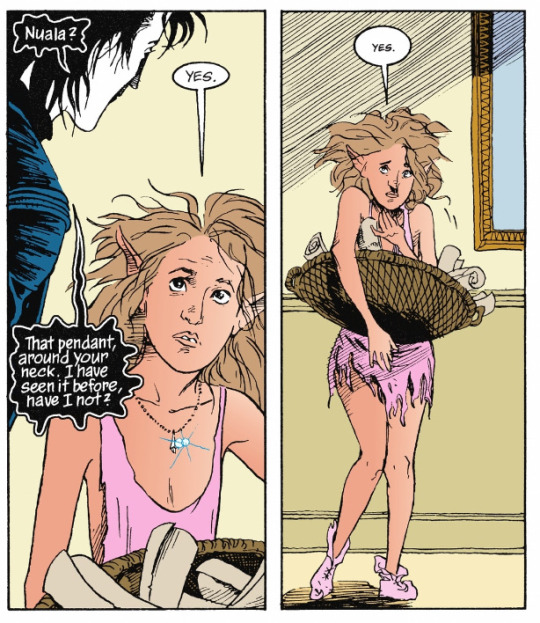
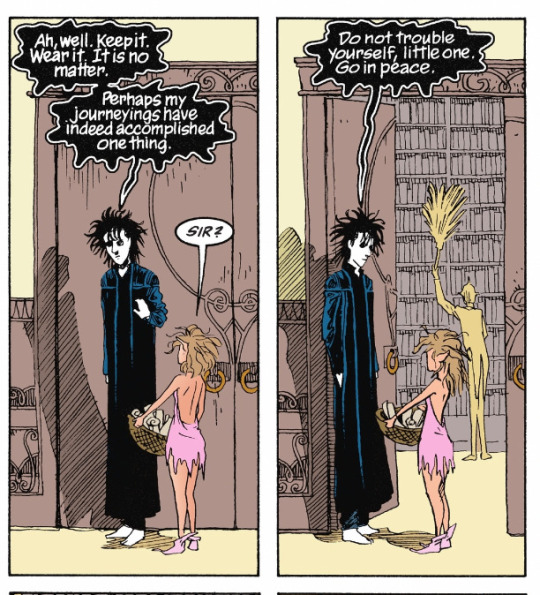
And although I’ve read it all a million times and had all these feelings before, I just need to blurt them out:
Love Is What Changes Him
It’s such a central message of The Sandman, but I feel it often gets lost in a million other things. And they’re all important, but so is this one.
Because yes, Dream went with Delirium and found Destruction (and Despair found him btw), and his Destiny was Death. And that whole Desire thing… ‘nuff said. BUT… (major spoilers ahead)
Those panels above are basically the turning point in a nutshell. No, well, the turning point is actually the moment he kisses (and then kills) Orpheus, but those panels are the essence:
He set out with Delirium in hopes to find Thessaly (the pendant Nuala wears here used to be hers, and she gave it to her when she left the Dreaming and him. And I can’t even begin to tell you how I feel about him letting Nuala keep a gift of his ex, who betrays him later by protecting the woman he hurt, and then making it the item that holds the power with which Nuala can call in her boon. One could spin that very far in all sorts of different directions).
But when he comes back after killing Orpheus, it doesn’t really matter anymore. Thessaly was the usual romanticised dream that could never be real. But he finally did find love. For his son. The unconditional kind. The one that doesn’t need anything in return because it just is. And he was loved back, if for a brief moment. But it was real, not a dream. And that love stays real (that’s why it initiates the turn, 3rd act and all that).
I’m reminded again of the words of Frank McConnell in his intro to The Kindly Ones:
“And with [killing Orpheus], Dream has entered time, choice, guilt and regret—has entered the sphere of the human.”
(Side note at this point: With all of this in mind, read Dream Hunters [again], and look at all THREE main characters—that includes the onmyōji, not just the monk and the fox.)
And it would be so easy to say, “Well, love killed him then, what’s the fucking point?” Not just the love for his son, but also the love of a maiden who called in her boon (Nuala), the love of a mother for her child (Lyta), the love of a crone for no one but herself (Thessaly).
But we all know that “change or die” was never an “either or”, because it’s an “and both”. And it’s ultimately love, in all its shapes and forms, four times over, that changed him (while it was also part of the death knell, but that’s a complicated one. In any case, it also led to change: To be(come) a new, better, kinder Dream).
Yes, call me romantic or hopeless (although I think that’s the wrong word in this context, because I feel it’s the opposite), I don’t care.
Because that story is about catharsis. And that means Dream is a vessel for our feelings. And the feelings won’t be the same if we change any of this, for better, for worse. Because truthfully: That story is about me. And you. And you.
About allowing love, of whatever kind (this is very clearly not just about romantic love), to change us. And that ultimately means letting go (of control). Just like he did.
Bleurgh, I’m crying. Catharsis 🤣
#the sandman#sandman#neil gaiman#dream of the endless#morpheus#daniel!dream#sandman meta#sort of because it’s a bit feely#and shortish and without a million references#but I’ve brought them several times#in my pinned post#sandman analysis#sandman character analysis#the sandman comics#nuala of the faerie#lyta hall#Thessaly#orpheus sandman#love changes#tragedy#catharsis#sandman spoilers#the sandman spoilers#sandman book club#sandman bookclub
77 notes
·
View notes
Text
The Corinthian: character abilities
The Corinthian is many things: nightmare, medium that reflect the darkness dwelling in the subconscious of human being, saint patron of serial killers and incomparable babysitter. In addition to all this, there are several references to his other abilities and powers in the comic books.
PHYSICAL STRENGTH
We do not have many opportunities to see the Corinthian fight. In The Kindly Ones, the three most significant occasions are the fight against the wolf, Loki and the spider Nybbas: all very important, as they demonstrate Corinthian's great physical strength; an element this, among others, that allowed him to first retrieve Daniel and then protect him in the castle.
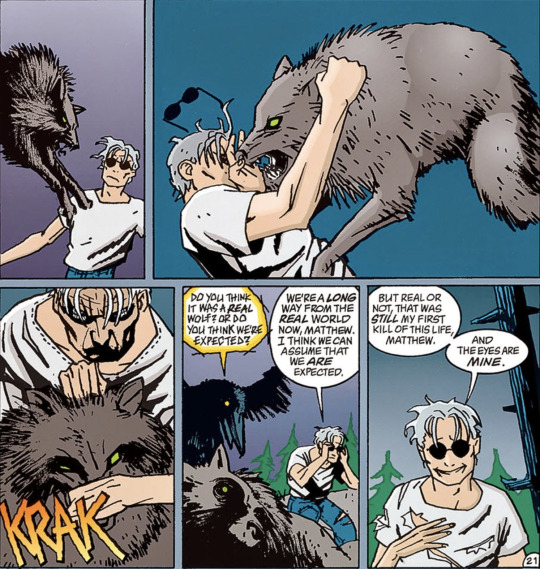
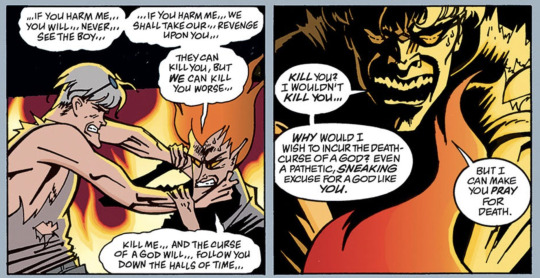
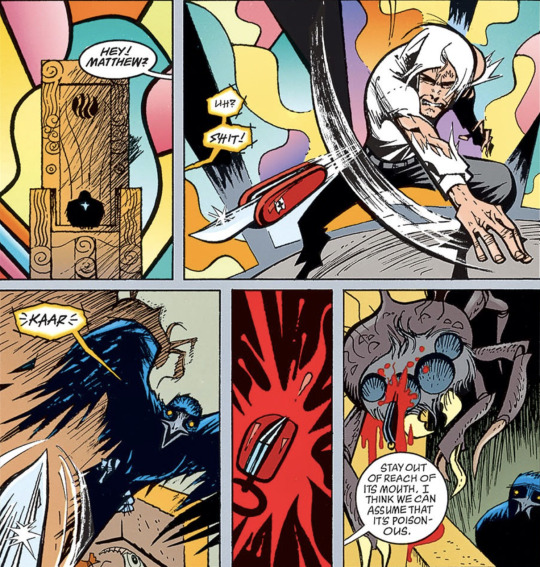
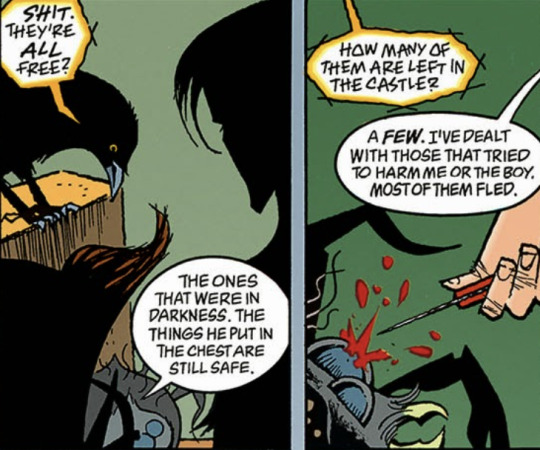
INSPIRE AND COMMAND DREAMERS' THINKING AND ACTION
This apparently is an almost "obvious" aspect (dreams and nightmares inspiring human beings) but very fascinating especially because of the implications it has with a character like the Corinthian. In Overture, during a dramatic confrontation with Morpheus, he makes an explicit accusation against his Lord: he can inspire and command Gilles de Rais, the famous Bluebeard, to commit any kind of nefarious deeds but he himself cannot be the one to do them in the waking world. This suggests a connection between the Corinthian and the ante litteram "collectors" he inspired that precedes his escape into the waking world, though less systematically than he would do later. More importantly, however, the word command implies that the Corinthian's power does not merely inspire, but may also be able to exert substantial action in the real world, albeit indirectly.
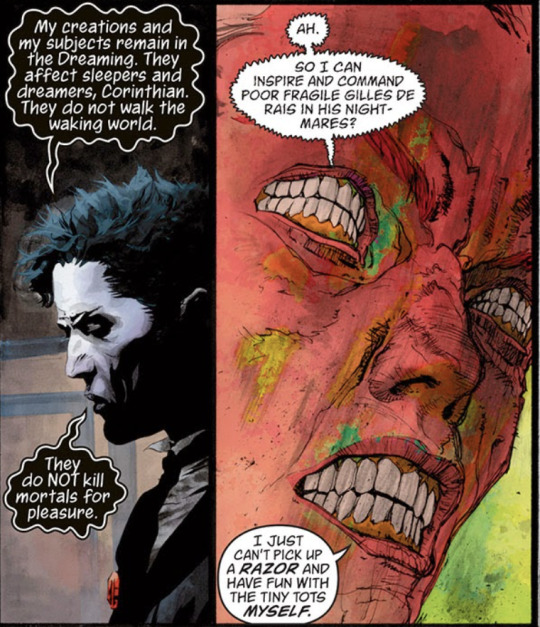
CLAIRVOYANCE
Perhaps my favorite, which I fervently hope to see well represented in the TV show in the future! The Kindly Ones reveals to us this gift of the Corinthian: he can use the eyes as a tool to see the past and the future those to whom those eyes belonged (and it is a gift he can offer to others, as seen in The Corinthian Death in Venice). You're sick/No, I am a visionary is one of the most beautiful exchanges in the entire comic! (and it's emblematic that Corinthian refers to himself with this expression).
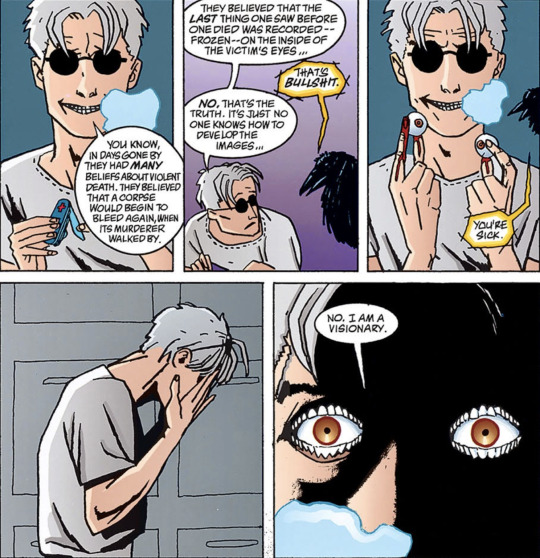
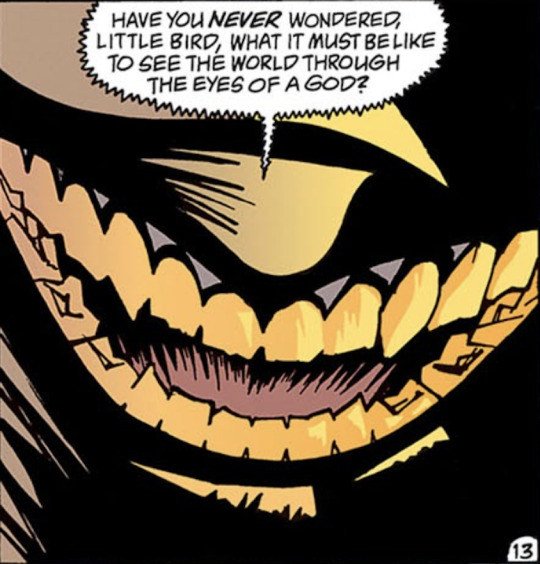
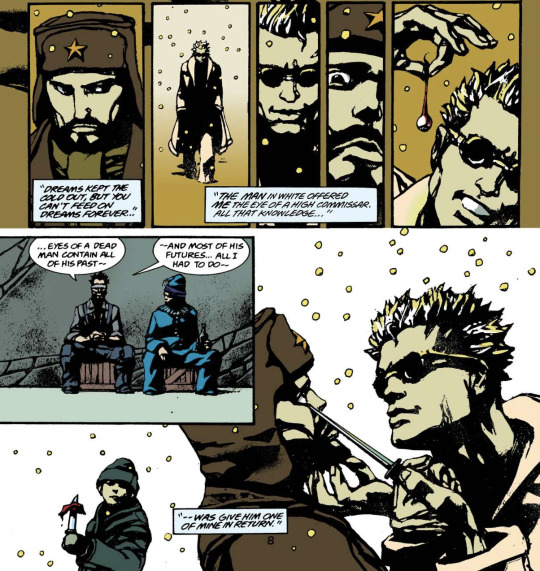
BODY SWAP
This is an ability shown in Death in Venice: the Corinthian, in the waking world, can takes possession of a man's body (and the man's hair turns white). This is one of his most disturbing and intriguing abilities and not far from the clairvoyance shown in The Kindly Ones: seeing the victims' lives through their eyes could be called a kind of possession, albeit in reverse.
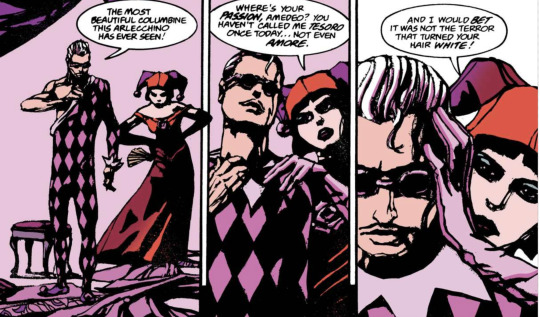
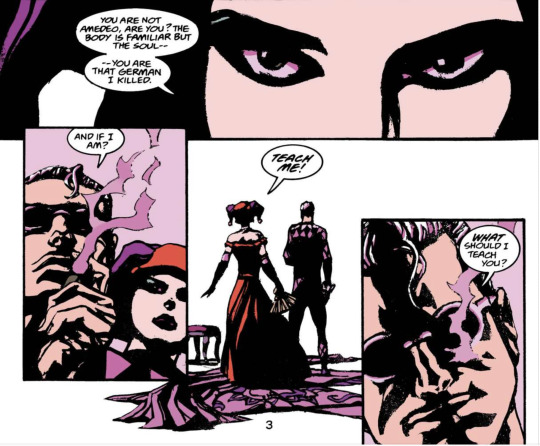
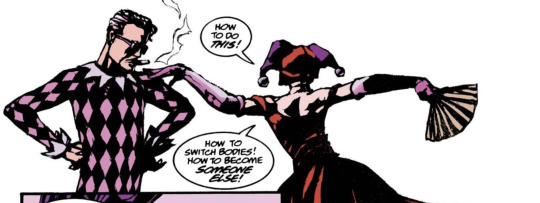
WRITING AND DRAWING
These are perhaps among his best-known talents (thanks also to the splendid Nightmare Country panels). Artistic creation, whether intended symbolically or otherwise, is a concept strongly associated with this character (and words such as visionary, collector, collection refer to the art world). "I am everybody's story. I am Dream's story" he states in The Glass House, and this would presuppose a kind of passive acceptance of his always being a tale, never a narrator. But the Corinthian, when he writes, brings back memories of victories in a life that is not his life. It is precisely inherent in his being the will to be a storyteller and not just a narration (obviously with all that goes with it).
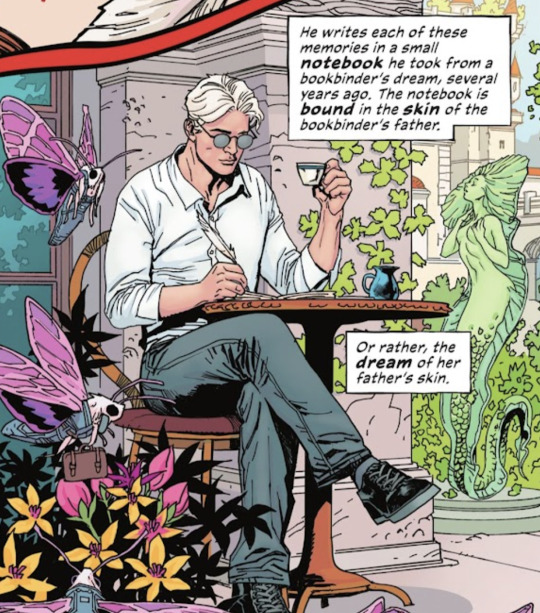
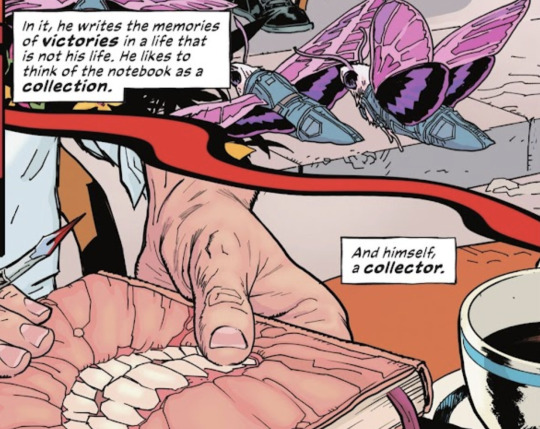
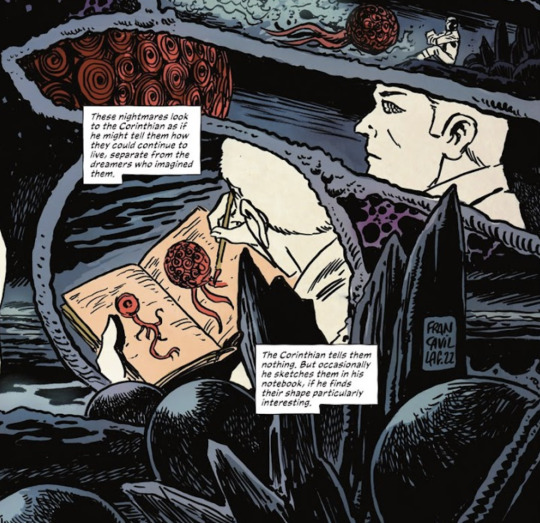
#the sandman#the corinthian#character analysis#sandman meta#the sandman universe#nightmare country#the corinthian death in venice#sandman comic spoilers
71 notes
·
View notes
Note
In another post you mentioned you had marked all your favorite Sunflower moments/interactions. Do you mind sharing your favorites with your devout followers?
Much love, Fauxraven
It is high time I come back to writing in here.
I will start by answering some questions, I've been overlooking for a while and then will share why I was away for as long as I have.
Let's discuss my favourite Sandflower interactions though. Thank you for the question and this is going to be quite lengthy as a post, but please bear with me. + the interactions are not ordered by how favourite of mine they are, but rather chronologically for the sake of order in the post 🪷
!Spoilers for the entirety of the Sandman comics under the divider!

Season of Mists
This one is very easy. It's the first time they meet and immediately two panels are very important to me as far as their relationship goes.
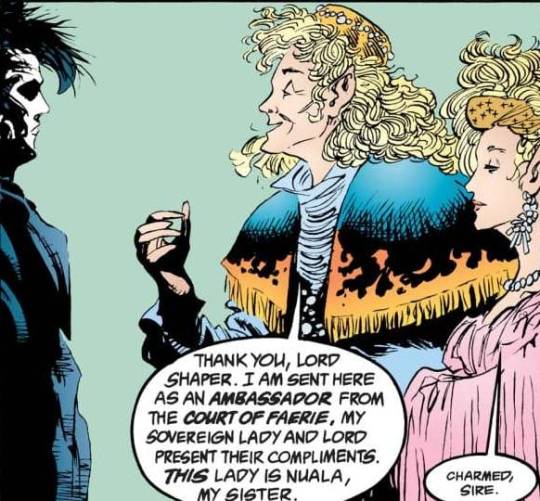
People make the VERY wrong assumption Nuala was always enthralled by Morpheus but she wasn't. She met him under her "Ice Maiden" title - a fairy so desired men died for a sliver of her attention. She went to the Dreaming as ordered by Titania, the reasons for which could be discussed in another post. Nuala being a gift to Morpheus is a very calculated move by Titania, putting both Nuala and Morpheus in extremely uncomfortable for them positions. Initially. The reason I love this panel is because it shows simultenously that Nuala didn't care about Morpheus at all and she was being arrogant towards him.
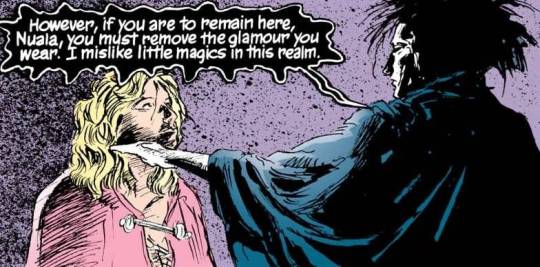
The second interaction in Season of Mists that I want to point out is this panel right here. Although on the surface this entire interaction is quite meaningful this panel right here is very important for two reasons. One and that is the obvious one, he is forcing Nuala on a journey of self-discovery and love, stripping the deceptive glamour thrusted upon her from the moment she first existed (all fairies wear glamour). Second, Morpheus notes to "misliking little magics in his realm", which is factually untrue - everything in his realm is magic in one form or another. What he dislikes is not being in control of the magic being distributed throughout his realm. So here already he had begun very clearly being dishonest with Nuala, which we will see further becomes a pattern - he will say one thing and do the exact opposite.
A Game of You
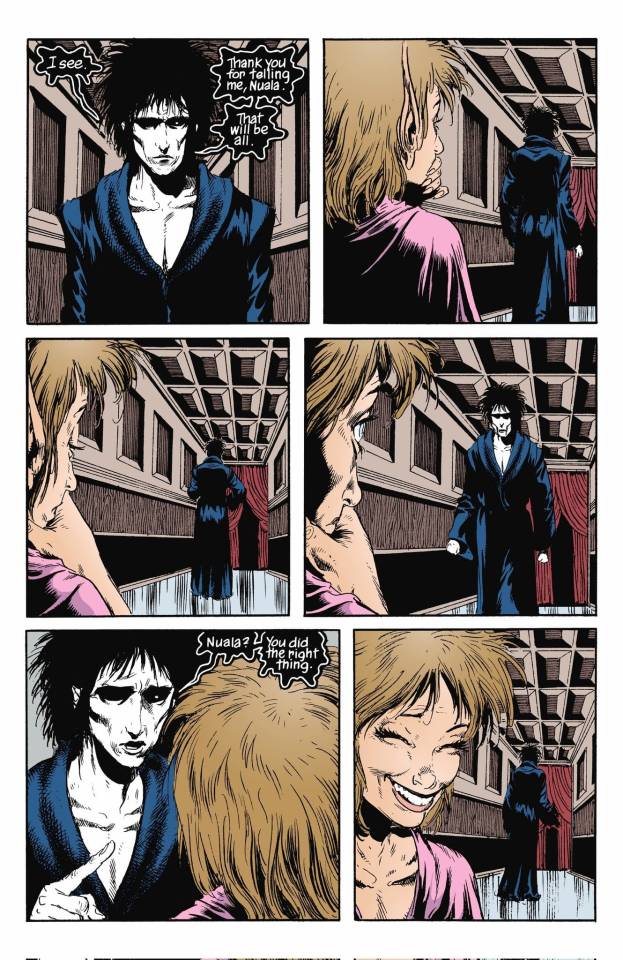
The famous page. But what people rarely talk about this panel is that Morpheus makes the active choice to be nice to her. Something he doesn't do. It is okay to not believe me, but go back, read for yourself, Morpheus doesn't praise people, he doesn't hand out empty compliments or say nice things to people in general. Now, this is the first time he does that with Nuala. He will do it one-two more times I think - he will praise her to other people and briefly before they separate for the last time. Nuala is someone Morpheus harbours positive feelings for. However, from that point forward, we will see Morpheus making the choice to act in a way he usually doesn't and do things he doesn't usually do. This is the face of the Sandflower community (me and my three bitches), but it is not my favourite panel by a long slide.
Brief Lives
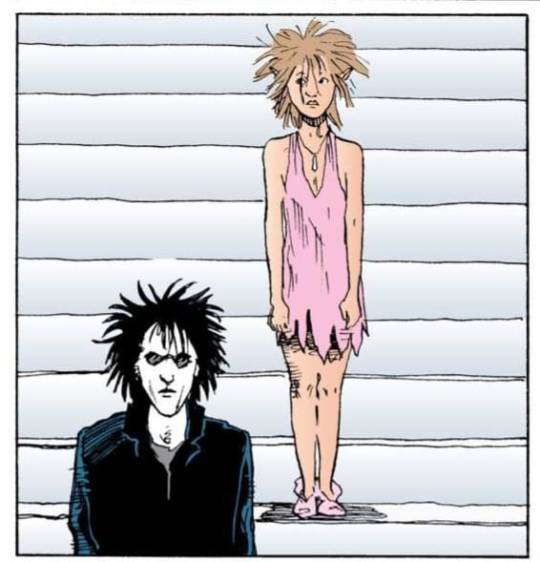
I can choose a lot of interactions from "Brief Lives" however that will take an excrutiating amount of time. The most important thing about Brief Lives is the pendant Nuala receives from Thessaly, Morpheus' nasty attitude, because he is being whiny he got broken up with and what a wonderful pretty girl Lala is. This panel encapsulates that so that's why it's here.
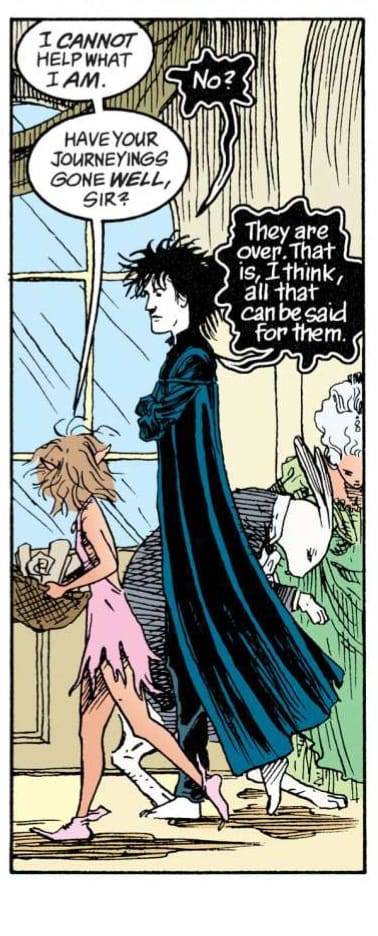
THIS interaction has to be top 3 of my favourite interactions between them. Remember when I said in the beginning people hold big misconceptions about Nuala as a character - that she is a weak, spineless character that fades into the background. This panel is my favourite to disprove those.
"Nuala is meek to Morpheus."
No, Nuala likes Morpheus, there is a difference. Because if she was meek, she would've never stood up for herself or put him in his place, which she does in this very conversation despite their more than obvious power dynamics. While Morpheus shows open distain for her people, Nuala simply and confidently tells Morpheus she cannot change who she is, which is a surprise to the Dream Lord. She is unwilling to allow to be slandered like that whether he is a king or a jester.
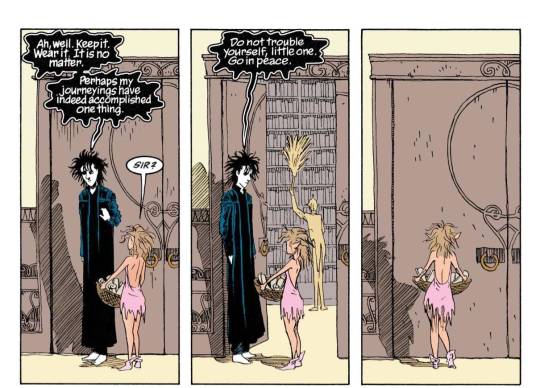
This one is here because 1. He lets her keep the pendant, which at that point is not deliberate on his side but it will become a point of deep connection between them (there is a theory about the pendant, another post I want to write a lot), in a way he didn't have with Thessaly mind you. 2. He calls her "Little one" and I think that is adorable.
World's End
I will not put anything from Worlds End because it's the most important Sandflower volume in my opinion. I will, at some point write a whole post about Issue #52. For now, if you're interested go read Issue #52.
The Kindly Ones
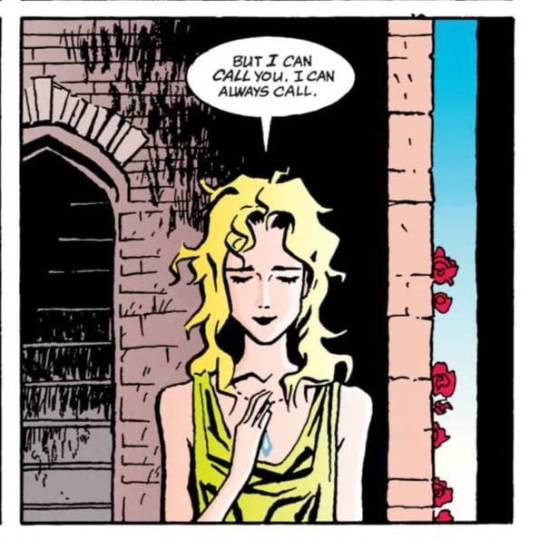
This is my single favourite panel in the entire Sandman. Nuala and Morpheus were the original "You came/ You called" and I can't wait to see it in the series through the eyes of Nuala's actress and Tom Sturridge. ( I want to write a whole separate post about the pendant too, so, for now this is enough).
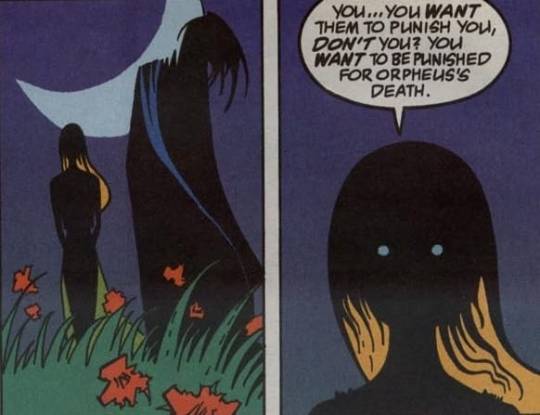
And lastly, I could put their whole conversation here and I could put the numerous comparison's between Morpheus' relationship with Thessaly and with Nuala. But I won't do that because they are irrelevant.
When Nuala became "The Maiden" both in the sense of the Kinly Ones and Persephone, she became a tragic figure bound by her love for a man that is quietly self-distructive. If you go back and read through the comic, there is a distinct uncertainty about Morpheus' coldness from his official partners - Calliope says he suddenly became cold; Thessaly believes he sees people as things he wants until he gets them and then he gets bored; Titania does not talk a lot about the nature of their relationship, however from context we can infer he also stopped responding to her at some point and she is still hung on him (as seen by her conversation with Nuala). Only Nuala recognizes his coldness for what it is - a deep inner hatred of himself and usage of loneliness as a means of punishment of himself. She ecognizes the patterns of his behaviours from his standpoint as opposed to her own, symbolizing the level to which they are connected, whether we as readers realize it or not (because I initially didn't). Nuala wants to save Morpheus, but she is very well aware that she can't.
As for Morpheus he choose Nuala as the last woman (because he did choose to go to her, he had every right to refuse and protect his kingdom, despite the boon) to visit before his death, even though Thessaly had at that point broken him up and he had given up (as by the red flowers in their feet). It is such a heartbreaking panel. Because it is the one that actually shows the depth to which Nuala sees Morpheus past his mask and the level to which Morpheus lies to her for a reason we never find out.
An amalgamation of all they had experienced together is him saying "He didn't notice" and yet, no one who has read the comics from start to finish believes Morpheus. He doesn't believe himself. She was the last person outside of his closest circle he ever saw. Why? Because of his responsibility to a boon? No. He could've left, he knew she would understand, even though she was most adamant he should stay. He stayed because he wanted.
~*~
My personal belief here is that Morpheus in his evident self-hatred did everything in his power to make Nuala turn away from him. He recognizes her as something good and we know Morpheus does not believe he deserves good things. So their last conversation is also a way for him to hurt her to a point where she wouldn't be in pain once he dies. Because she is good and he is not.

Author's note:
It's on posts like these that I realize how much I've uncovered about Sandflower since I first started. I genuinely thought I was in a crackhead space and yet, going back and reading again it's truly baffling how many times Neil wrote actions instead of words - because the good thing about comics is that we can not only read we can see, and the actions Morpheus takes towards someone he doesn't seemingly care about all that much, do not align with his words. I encourage everyone to make their own headcanons or draw their own conclusions. These are my personal and of course they highly reflect my biased viewpoints.
Love,
Li
#the sandman#nuala#nuala of the faerie#morpheus#sandflower#dream of the endless#the sandman netflix#nuala the sandman#Sandman analysis#sandman comics#the sandman comics#sandman meta
64 notes
·
View notes
Text
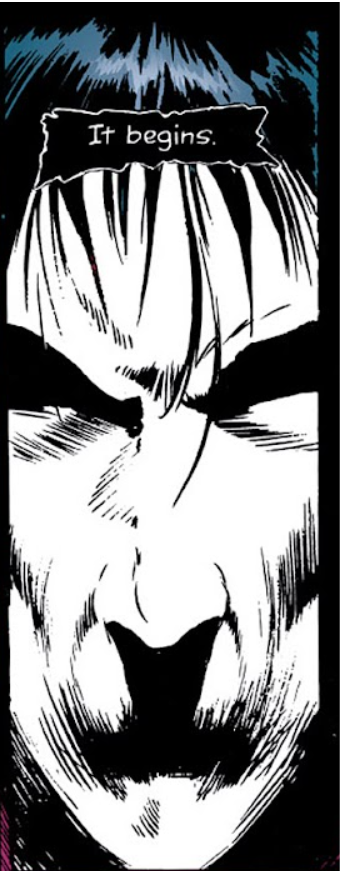
GREAT READING ADVENTURE PART 1 (CW: pictures from the Sandman comics may be disturbing to some)
I started with the Sandman, by Neil Gaiman. A legend in comic spheres, and one that I'd been wanting to read for a while.
I found 10 volumes at my local library and have made my way through two of them so far. First off, as a horror book DAMN. DAAAAAAAAAAAAMN these books do not pull punches. They come at you like a gut punch and just keep going. I like to describe myself as someone who enjoys "horror lite" I love monsters, I love angst and crazy situations and some messed up stuff, but I'm kind of a baby about it. Things like Supernatural, Gravity Falls (It's kid friendly, but there's blood!), Buffy the Vampire Slayer, that's my jam (wow, that list makes me feel about 5 years old, but whatever! I like what I like!). The Sandman Is Not That.

The Writing
Don't get me wrong, it is beautiful in every way, but it's also a lot for a wussy like myself. I'm enthralled, captivated, unable to look away, but there have been multiple times where I've needed to close my eyes for a second and remind myself that this is a comic book, and the world isn't necessarily this dark all the time. I'm pretty triggered by children in danger/getting hurt/dying and these books don't shy away from that. But they're also just . . . so beautiful.
The writing is annoyingly amazing. I expected nothing less, it is Neil Gaiman, but sometimes as a writer you look at other people's writing and just sit back in awe. I wish I could write something like this. Or, if not exactly like this, something as beautiful and poignant as this. The story flows so beautifully. Every scene perfectly blending in with the next. Every word feels like it has a point, which makes you want to pay attention to everything to make sure you're not missing anything.
Writing is my main background, but comic writing is so different from prose. This is what I struggled with the most while drafting up OUTCAST ODYSSEY, how do I get everything across that I need to when I can't just write it all out? How do I pace it when telling a story with pictures vs words feels so different? But Neil does this so well. It felt lyrical, and I could see his influence on every single page. The art was done by someone else, but the ideas, the imagry, the way the story flows from one idea to the next, is all a result of absolutely phenomenal writing.
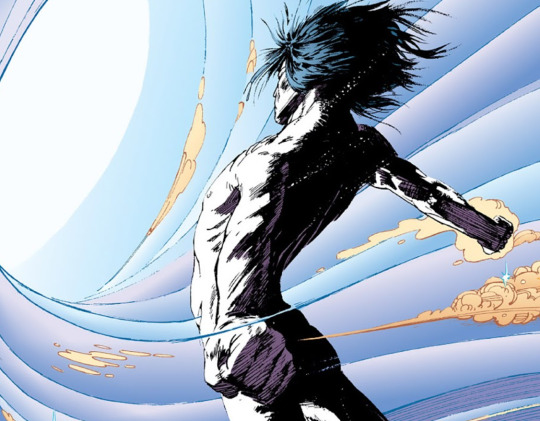
It reminded me to trust readers to read between the lines. It's difficult to find the line between "subtlty" and "confusing" and I am often guilty of feeling like I need to spell things out to my readers so that they won't miss anything, but more often then not that just slows down the plot and makes the whole experience clunky. You don't want to go too far in the other direction either, but Neil knew who his audience was and trusted them to at least give things a second glance. I was worried at the beginning that I'd be too dumb to figure out what he was hinting at, but he was able to patiently feed me the information without me getting frustrated or lost.
It's a skill that comes with experience and practice, but I feel like this story really really shines at it. I found myself studying the way he handled exposition and wanting to emulate it in my own work.

The Art
The art is also stunning. It's not "cute" art. It's not something that I would want to hang up in my house or look at for hours. It's amazing from a skill standpoint (which is easy for me to tell just due to my own extremely obvious shortcomings) but it's not concerned with everyone looking like hollywood movie stars.
Which . . . I mean, that's definitely a feature, not a bug. This story is not supposed to be cute, and a cutsy art style would absolutely ruin the atmosphere. It is rough and full of sharp points. it doesn't shy away from nudity or gore. The characters are not attractive, these are not anime stars, but they are compelling, and distinct enough that I was able to easily tell who everyone is, which is more often then not extremely difficult for me (i think I may be a bit face-blind).
The art adds to the horror of everything. Even when things are supposed to be calm, or sexy, or whatever, there's an edge of panic and unease to it. Part of that is the reader knowing that there's more going on behind the scenes then the character knows, but it's also the style. The heavy black shadows, the hard lines, the emphasis on some details while the obscuring of others, it all combines to perfectly compliment the writing. It's not a pleasure to look at, but that's absolutely the point. It's also extremely difficult to look away FROM. How can something simultaneously look jarring, eerie, and unpolished, while also whispering "Yes. This is beautiful art. Look at it. Bask in it."?
I'm a newbie artist. It's way beyond my skillset to even begin to figure out how they were able to accomplish this. But someday I hope I figure out the secret.
The art perfectly compliments the writing, and the two work together to tell the story. I remember feeling a little annoyed on the artists' behalf that the Sandman is always known as "Neil Gaiman's" when the art side of comics is so incredibly important. The art sets the tone and compliments the words. It helps with reading between the lines and helping us know how seriously we should be taking the words.

Characters
All of the characters are great! Except the ones I already knew. I'm not saying they were bad, just bland compared to everyone else. Constantine, the Justice League, every cameo that came up and I was excited for felt . . . not quite out of place, but not quite seamless either. I was most excited for Constantine, and he was fine, but I probably have enjoyed him more in every other comic I've ever seen him in. I know they were all included just to try and sell the first few issues of a new story, and I respect that (the amount of comics that I've read just because my favorite character showed up for a few panels is . . *cough* embarrassing), but I was kind of bummed by how little conflict they added to the story.
Constantine immediately agrees to help Morpheus (which, okay, he can see how powerful Morpheus is and doesn't want to get on his bad side, totally in character. But I like Constantine best when he's being a bit of a dickhead), when I was really expecting a bit of tension or at least antagonism between them. We briefly see Etrigan but he is so quickly outshined by Lucifer that I nearly forgot about him, Scarecrow shows up but I didn't really feel like he added much besides a familiar face, we see Scott Free (who I know very little about) and J'onn (whose reaction to Dream was probably the most interesting) but all they do is immediately tell Morpheus where he needs to go. Why were they so quick to be okay with this obviously terrifying powerful force just grabbing stuff? I guess I understand why J'onn was okay with it, since he knew who Morpheus was, but it still felt weird that there wasn't even a single moment of hesitation or resistance. They basically served as a plot GPS.
Again, there's nothing wrong with any of them, they just didn't feel as vibrant as all of the other characters we were introduced to. Even the woman who gave Dr. Destiny/Dr Dee a ride was more vivid and felt more real and purposeful than the cameos did. At least to me.

The original characters (or at least everyone I didn't recognize. Was Dr. Dee a Gaiman original or had he shown up previously? Cuz he was very much A tier villain for me,) were all amazing and vivid and lively. I cared about them way faster than I normally do, especially at the very beginning of a story. The cameos felt exactly like what they were: Cameos to sell the book.
Final Thoughts
This book is, objectively, better than anything I will ever create. And that's not even a diss on myself, it's just objective fact on the quality of this piece. I learned a lot looking through it, trying to figure out what Gaiman did that worked vs didn't. The lyricism vs crassness of the writing, the way the art complimented the dialogue, how the panels flowed and where it was easy for me to follow vs where I got a little confused. It's a beautiful book and I can absolutely see why it's a graphic novel must read. I'm planning on reading the rest of the series, but I can only read one volume a day, because the horror of it all absolutely follows me after I close the last page.
#reading analysis#reading challenge#the sandman#morpheus#the sandman graphic novel#comics#DC#learning to be a better writer and artist#studying the greats#the great reading challenge of 2024#neil gaiman#best graphic novels#list of best graphic novels
7 notes
·
View notes
Text
God in Hellblazer vs Lucifer comics
I have a lot of thoughts on the angel characters from Hellblazer/Sandman/Lucifer (basically the DC/Vertigo comics era). I've had them for a long time but I guess I'm only getting to writing about it now. I have a whole essay to write about Remiel from Sandman, but for now, this should do as a warm up.
Though Hellblazer and Sandman are supposed to be in the same universe, it gets really messy with different writers and storylines going in different directions, more so when you include Sandman's spin-offs, like the Lucifer comics and its sequels.
I think one of the most glaring differences is their portrayal of God. God seems... so much nicer in the Lucifer comics (both the Mike Carey (2000) and Holly Black (2016) runs).
And I think a lot of this is caused by the themes of each story.

Hellblazer has some really strong political themes going on, so much that I can't possibly analyze them all. What I do know is that gods/angels/etc in the story tend to represent people in power and privilege. So for example, look at what John says to the archangel Gabriel in the bottom right panel: "You're the ones that make the frigging rules for us, and you don't even understand us!"
In effect, God, as well as the heavenly hosts, tend to be portrayed as jerks.

The Lucifer comics take a different approach. The story's themes tend to gear more towards family, identity, and free will. The protagonist is a really headstrong guy who wants to be free of his omniscient, omnipotent, dad. In his words (upper right panel): "This face is mine. This scar-- is mine. You may not have them. Not without my permission."
Because of the "messed up family" angle, God tends to come off as more well-meaning, but flawed.
Reading the comics together and considering them in the same universe can get jarring when God is so patient with Lucifer, but so damn harsh towards The First of the Fallen and Gabriel.
(and yes I know the Lucifer spin-offs aren't or are dubiously canon, but for this analysis, just consider them canon)
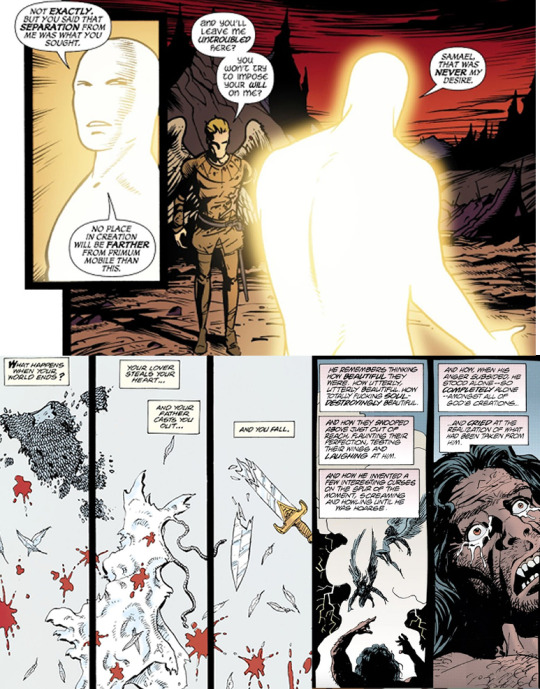
When Lucifer rebels and causes a whole war, God gives him a domain to rule over in order to give His son what he wants: to be away from Him. (top panels)
But when First of the Fallen and Gabriel even step a toe out of line? They get cast out of Heaven in painful, soul-crushing ways. (bottom panels)
And I guess it just ends up coming off as if God has some pretty massive favoritism towards Lucifer?? XD Like wow the Morningstar gets so much leeway, but FOTF and Gabriel get tossed out so fast??
In the end though, it doesn't bother me. I think the dynamic can even enhance the story in fascinating ways.
The story where these 2 portrayals get reconciled is through Gabriel's character in the Lucifer (2016) run by Holly Black.
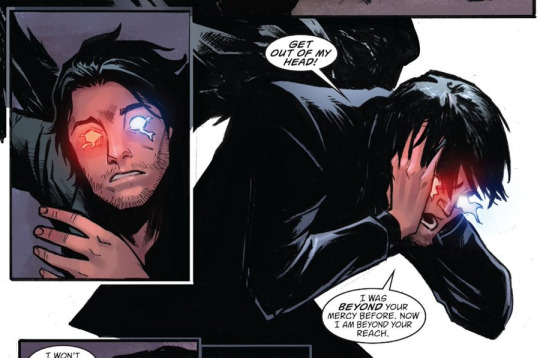
Gabriel in this run shares a backstory with his Hellblazer self, and though the specific events leading to his Fall were only briefly touched upon, his treatment and relationship with his Father retains those themes of free will and identity, while also portraying God as harsh and tyrannical.
When a God that turned evil tries to take away his free will, Gabriel cries "Get out of my head! I was beyond your mercy before. Now I am beyond your reach."
God tossed him out so mercilessly the first time, so why does He get to control him now?
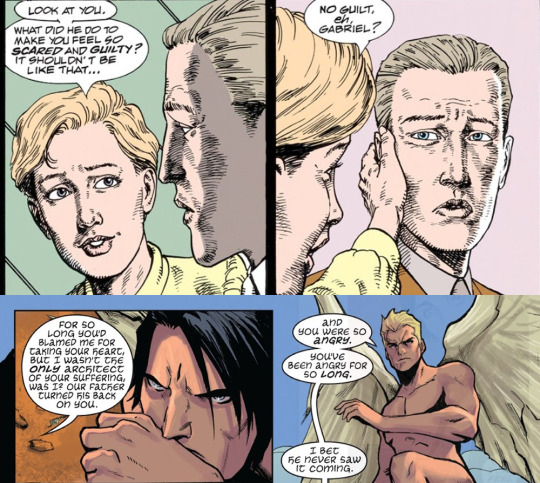
Gabriel in Hellblazer is a proud snob who views things through a very self-righteous black-and-white lens. It's revealed however, that his Father's strict rules and harsh punishments have left him anxious, guilty, and afraid (especially following an eye-opening interaction with John Constantine).
When he opens up about his problems to Julie (actually a succubus named Ellie) in Hellblazer, she says: "Look at you. What did he do to make you feel so scared and guilty?"
When it's revealed in Lucifer (2016) that Gabriel killed God, Lucifer says: "Our Father turned His back on you. And you were so angry. You've been angry for so long."
The Lucifer (2016) comic manages to show God through the lighter lens while also acknowledging his harsh treatment of Gabriel.
And we see this in Gabriel's character. In Hellblazer he's nervously looking over his own shoulder, in Lucifer (2016) he's proudly passion's fool.

And while we're talking about Gabriel, his self-actualization arc is one of the main reasons I love Holly Black's run despite its flaws!
I love how they continued his story from Hellblazer. There's a story about a guy living under his strict father's thumb who fell from grace when he was cast out, then got back up with the help of family and friends who support him. It says something that by the end of the story, he no longer works for Heaven but instead for Hell, serving under Mazikeen who acknowledged him at his lowest. He also gains his wings and heart back-- the former from Lucifer and the latter from Raphael, his brothers.
That's all I have to say XD. This was just supposed to be an observation but I ended up talking about Gabriel lol
#vertigo angels#sandman comics#lucifer comics#hellblazer#lucifer morningstar#first of the fallen#gabriel#analysis#just my thoughts
6 notes
·
View notes
Text
So, I’ve seen a couple of people asking about the “rules” of the Endless: 1) the Endless cannot fall in love with mortals and 2) the Endless do not interfere in each other’s affairs. As a big fan of the comics, I thought I’d share some lore for those interested!
1) It’s a little unclear who exactly made the rule that the Endless cannot fall in love with mortals, but it has not always been the case. The rule was made sometime at the dawn of time, after a meeting between personifications of the stars and dimensions of the universe to decide how the universe would be organized. Dream brought his mortal lover, Killala, to the meeting, where she met the rest of the Endless. Notably, Desire was Dream’s favorite sibling at the time, in his own words. However, due to events involving Killala, Dream declared that they were no longer friends, and warned Desire to stay out of his affairs, thus beginning their rivalry.
The impression I’ve always had is that the rule is a direct result of those events. Perhaps the powers of the universe were wary of the potential fallout of such a relationship; perhaps a heartbroken Dream suggested it himself, or one of his siblings did. Perhaps it came later, after other relationships, other breakups, and the fallout grew concerning enough that the Powers were forced to act.
However it came to be, the rule was made, and it stands as one of the Rules, with immediate, cosmic consequences for breaking them, as told in Nada’s story.
2) This is also the origin of the second “rule” – although this stands as not a cosmic Rule with immediate consequences, but simply a courtesy between the Endless. Because otherwise they’d be constantly at each other’s throats.
Since their falling out, Dream and Desire have never gotten on, and Desire has repeatedly needled Dream, attempting to manipulate his affairs to their advantage. The last time Dream asked for help from his siblings, Desire was the one to answer – and ended up causing more pain than they solved. So Dream refuses to ask for help, and proudly denies that he might need any, even while literally collapsing at his brother’s feet. The others don’t help Dream not because they physically can’t, because it’s a rule, but because Dream refuses to let them.
‘Stay out of each other’s affairs’ isn’t a rule so much as the sign Dream painted on his door to try and get his siblings to leave him alone. It works maybe 50% of the time. At best.
In summary, all of the rules are a result of the Endless being a completely dysfunctional family and Dream being a petty bitch. Cheers!
#just thought i'd share#seriously the comics have so much lore in them#have a question?#the answer's probably in the comics#and the rest is up for interpretation :)#enjoy!#sandman#sandman lore#bit of my own interpretation in there too#sandman meta#meta#meta analysis#dream#dream of the endless#endless#desire#desire of the endless#killala of the glow#killala#sandman comic spoilers#endless nights#the doll's house#sandman: overture#long post#ish
37 notes
·
View notes
Text
We Need to Talk about Death of the Endless
Yep, I’m back at it again with my third “and yet another thing!” about Neil Gaiman’s The Sandman thus far. In this case, it concerns one of the most fan-favorite characters in the series: the protagonist’s older sister, Death of the Endless.
[Essay as well as link to the google drive version under the cut]
Since she’s such a favorite, I’ve noticed a tendency among fans—including myself—to automatically trust anything she says as “true” in canon. Not only is she one of the Endless, the beings above even gods, she’s Endless that embodies death, perhaps the most fundamental function of all of them (yes, I’d argue even beyond Destiny). On top of that, she’s also the nicest and most personable of the seven. Part of the reason the audience likes her so much is because she’s so friendly compared to her siblings. She seems like someone you’d want to hang out with, if that didn’t necessarily mean dying.
She’s purposely made that niceness part of her function in-universe. She admits that she used to be as fickle and cruel as her siblings, but later had the realization that it’s much better and easier to work with humanity when you’re a friendly face and a helping hand towards people having literally their worst (and last) day on Earth. We want to trust her, and she wants us to trust her in turn.
But she’s as fallible as anyone else.
A major theme in The Sandman is the lack of perfection among supernatural figures. There’s no perfect divinity here; the most powerful fundamental forces in the universe are embodied by a severely dysfunctional family with a tendency toward almost pathetic levels of immaturity. And Death, as much as we all love her, is a part of that family. Being the most put-together and friendly member of that family doesn’t make her actually perfect.
Why is this important? Well, I already touched on this in my first essay, but I believe a significant reason readers interpret the ending of the series as simultaneously a tragedy and a suicide (in a really awkward way, as I explained) is because Death herself suggests it is such. I also recently saw a post (I have unfortunately lost the link) that suggested that Death’s reaction to Flower-Dream’s death in Overture and her reaction to Dream going off to Hell in Season of Mists were also evidence that she knew Morpheus’ death was inevitable and imminent and that he was suicidal. Which, indeed, that could be the case. But one line from “The Sound of Her Wings” keeps bugging me:
“Look at you! Sitting here, moping. It isn’t like you.”
Supposedly, Death is the closest of the siblings to Dream. And yet, she somehow decides that Morpheus being irrationally mopey is out of character?
When I first read that issue, I assumed that maybe Dream wasn’t always this angsty, but of course the rest of the series bears out that, yes, Morpheus was always Like That. Arguably, he used to be worse.
Part of the reason the Endless aren’t close as family is because of the rule that they aren’t supposed to interfere with each other. Apparently that even includes positive interference; at the very least, that’s the only explanation for why Death didn’t save Dream from Burgess’s fishbowl. Well, the only explanation that doesn’t make her seem like a complete asshole. It was obvious that Dream’s imprisonment was having negative impacts on humanity, and the deaths that occurred in the Burgess household meant that she had to have been there and known where her brother was. So, either she must abide by the rules, or she’s a jerk, and I have to say I’d prefer the rules explanation. But if non-interference extends to even positive events, then one can assume that, outside of scheduled family dinners that are likely related to the function of the universe, the family members don’t actually see each other much and subsequently don’t know each other that well.
So maybe Death really doesn’t know her brother as well as she would like—or as much as we, the readers, would like to assume she does. Maybe she really didn’t know he was struggling. And even if her supernatural station as embodiment of death meant that she knew he was going to die, that doesn’t mean she automatically knows how, or why. I’d previously explained how her encounter with Element Girl showed why she might have assumed that Morpheus planned suicide, but I think that story also shows that she doesn’t know whether death is inevitable or how someone will die either. She spends most of that issue trying to dissuade Raine from suicide; she wouldn’t bother if everything was all just fated.
(And shhhh yes, I know that the line from “The Sound of Her Wings” might just be a leftover from early writing where Gaiman didn’t know how the characters or story would be yet, but let’s ignore that and look at the text as complete and intentional for the purposes of this analysis…)
So yes, Death is lovely and kind and one of the most—possibly the most—personable of the Endless… but that doesn’t make her perfect or omniscient. We can’t necessarily take her word as “true” any more than anyone else’s. To assume so would be to forget one of the core themes of the whole work.
@serenityspiral @duckland @roguelov @notallsandmen @ambercoloredfox @onehundredandeleventropicalfish
#the sandman#the sandman comics#death of the endless#the sandman comics spoilers#the sandman comics analysis#the sandman analysis#the sandman meta#the sandman essay#my writing#original post
78 notes
·
View notes
Text
Just rewatched Calliope episode of The Sandman and it occurs to me that this episode strongly implies that Orpheus is dead and gone??
The Hecate state that he "died in Thrace" (which technically he did in the comics too but he lived on because of Death withholding her gift).
Then when Calliope requests to visit Dream in the Dreaming sometime, in a change from the comics she gives her reasoning as "so we may talk about our son and grieve him properly".
Yet in the comics, it is made clear that Calliope visits Orpheus on the island at least somewhat regularly both before and after her imprisonment. So what she says in the show doesn't make sense unless Orpheus is already dead properly in the show?
But that would be a huuuuuge change to the story so surely thats not the case? I probably missed a lot of discussions about this after the show first came about before I caught the brain worms and had to analyse the comics with a fine tooth comb so I would love to know what others think about this.
@duckland @so-i-grudgingly-joined-this-site @notallsandmen tagging for your thoughts as well as anyone else who wants to answer!
416 notes
·
View notes
Text
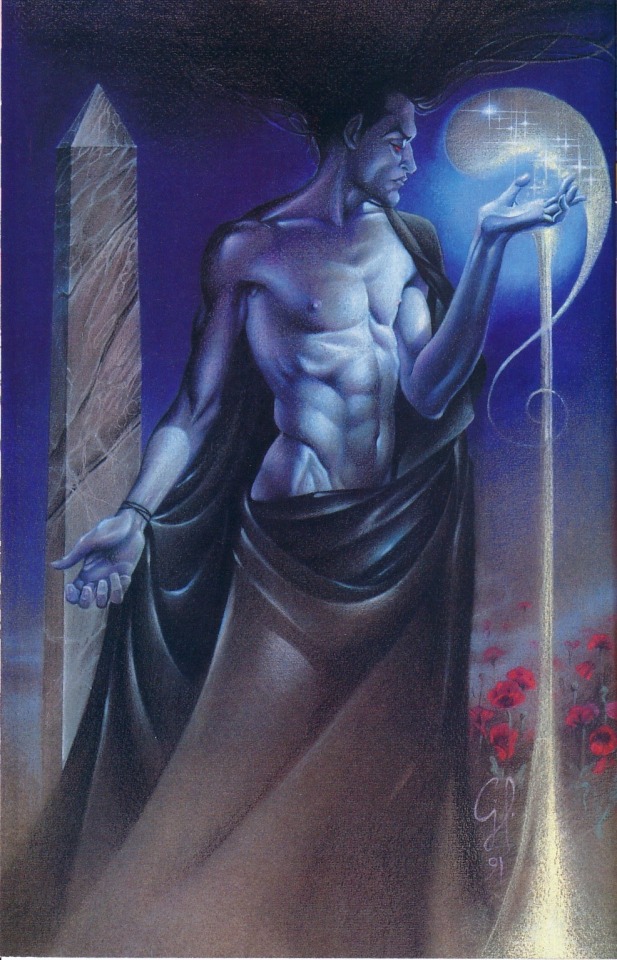
Dream—Craig Hamilton
I can’t get over the symbolism in this one. The poppies stand for themselves of course, but the obelisk!
No matter if you look at ancient Egypt or Greece, it is so loaded with connotations to creation, gods and kings (especially sun gods like Ra and Apollo, and many pharaos and kings used obelisks as a symbol of divine power), connecting earth and sky, often symbolising a ray of sun. And that connection is also so beautifully mirrored in Morpheus himself, with his hair basically becoming one with the night sky.
The positioning of an obelisk was either east-facing (rising sun/rebirth) or west-facing (setting sun/death and afterlife). The capstone (the pyramidion/benben stone) stood for Ra’s first emergence because the original benben stone was believed to have risen from the primordial waters: a symbol for the literal birth of life/creation and renewal. And since the ancient Egyptians believed in an afterlife, an obelisk also meant safe passage and ascension of the soul.
I particularly like the myth of Bennu (a heron-like bird) that would sit on the benben and cry/sing one last time when all Gods die (and it would be told to sing by Ra himself because it was basically connected to/a part of his soul). The Bennu might also have been the ancient inspiration for the legend of the Phoenix.
And while there are no birds to see in here, the mythology surrounding obelisks dnd their capstones is honestly so fitting—including the connections to sun gods and Phoenix-like birds.
And it is so interesting to me that the Sandman in general makes so many references to Morpheus/Dream getting mixed up with Apollo, be it by worshippers, be it as Calliope’s consort/Orpheus’ father, be it through Aristeas (who was Apollo’s raven), be it through putting Orpheus out of his misery (there’s that part of mythology, too—it’s complicated). There’s some strange balance in replacing the epitome of sun/light with its (seemingly) opposite. And of course an obelisk stands for balance, too…
#the sandman#dream of the endless#morpheus#sandman#craig hamilton#sandman art analysis#definitely a bit sparkly#sparkle content#Hamilton only draws thirst trap Morpheus#useless (useful? 🤣) side comment#and yeah there’s THAT interpretation too 🤣#queer comic book artists#queue crew
79 notes
·
View notes
Text
@windsweptinred still on the subject of rules, if I remember well, in the comics we never see the First bow before Morpheus, while we see the Second Corinthian bow before Daniel...
It makes the memory wipe all the more intriguing because what is Daniel so fearful of, he feels the need to protect the Corinthian from himself
I totally agree! even Flynn's role as 'guardian' is a way of protecting the Corinthian from himself, from that instinct to kill which, as in a wild animal, cannot be tamed
#“There's a Destiny level unwillingness to step outside of the rules / except when it comes to the Corinthian”#another interesting thing is this Destiny/Daniel parallelism on the way he relates to the rules!#I think that this more than being related to his 'young age'#is really a distinctive trait of his personality#Daniel is the director who does not allow any improvisation from his actors#with the exception of the Corinthian#characters&analysis#corinthiel#the corinthian#daniel hall#sandman comic spoilers
13 notes
·
View notes
Text
Besting death-
The idea of besting death and gaining  immortality is something that spans across most cultures. A lot of mythology across the world has stories of someone trying to be immortal for one reason or another. In the sandman there are two notable characters who have bested or made a deal with death and cannot die. Orpheus and Hob. It’s interesting to me because neither of them really set out to obtain immortality. Hob was just drunk and Orpheus just wanted to save his wife. It’s the ‘be careful what you wish for’ lesson but with two very different outcomes.
⚠️comic series spoilers⚠️
Bright side of life-
Hob hasn’t always had a easy life, he’s had many mind you but he reminds me of a farmer. He really lives under “feast or famine” he can have a great decade/century or a horrible one. It all depends. Though his later ones have been very well off, even if he has to deal with the heart ache of wives, loved ones and friends dying off and it becoming a cycle. He’s had his fight with the bad parts of humanity but ultimately came out with a lust and love for life, he wants to stick around and see what’s next.
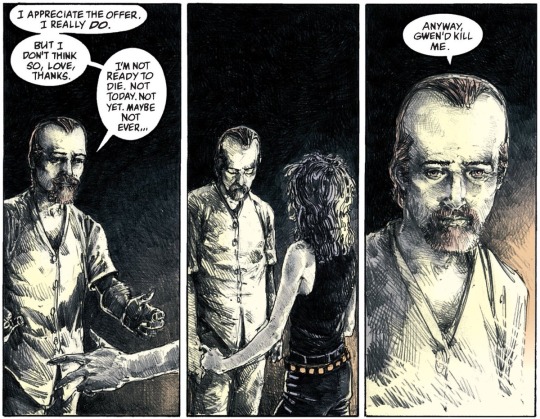
Consequence of love-
Orpheus on the other hand never intended to live forever. He just didn’t read the fine print to the deal he had made with his aunt- stubborn and grieving he charged headfirst towards death and the underworld. One thing on his mind. And for his love, for his stubbornness, he suffers eternally. He has no body, no friends or loves - he has his grief and that is it. He got the hard lesson, he got the endless pain and begging for death that Dream expected Hob to have after a few centuries! It’s actually insane how connected these two characters are, in this sense at least.

#the sandman#sandman#sandman comics#the sandman comics#sandman meta#sandman neil gaiman#neil gaiman#orpheus sandman#hob gadling#death of the endless#death sandman#character analysis#character comparison#dream of the endless#Morpheus#comic spoilers#light spoilers
25 notes
·
View notes
Text
TENTATIVE ANALYSES: THE SANDMAN
ISSUE 1: SLEEP OF THE JUST
In 1988, Neil Gaiman proposed a project for the revival of the 70's DC series The Sandman, about a vigilante that put criminals to sleep with anesthetic gas. DC editor Karen Berger accepted the pitch, but clarified that they wanted a new Sandman. The name could stay, but Gaiman could go off with the rest however he wanted. He definitely complied.
This first issue I'll try to analyze was published on November 29, 1988; as you'll see, a vigilante with sleeping gas appears for all of two panels. The story is by Neil Gaiman, the drawings by Sam Kieth and Mike Dringenberg; the letters are by Todd Klein and the colors by Daniel Vozzo.
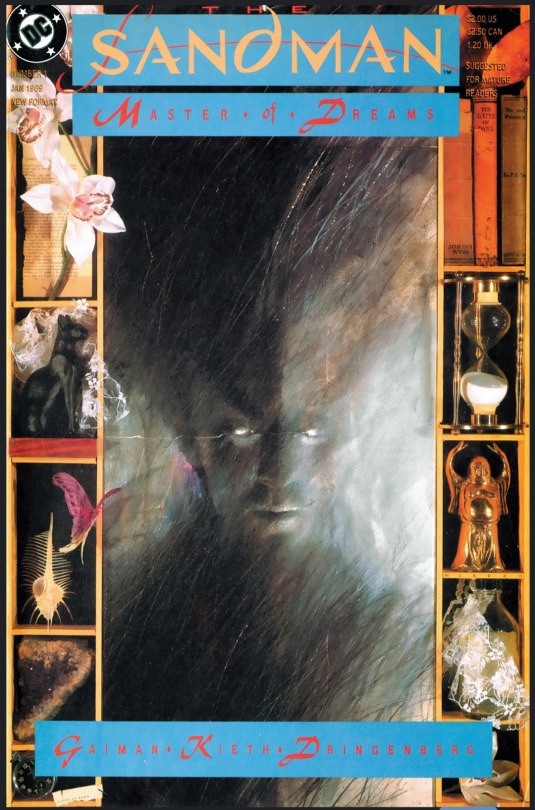
NARRATIVE STRUCTURE
While the protagonist of the Sandman comic is Morpheus, the true protagonist of this chapter, the one whose story we follow, is Alex Burgess. After all, while the chapter shows the seventy years Morpheus spent in his prison, forty pages of nothing but someone stuck under a glass dome would be pretty boring.
In regards to Alex, the narrative structure is an outright tragic one, which I'll use the Freytag Pyramid model to illustrate.

1. Introduction: the presentation of the setting of the story, its characters, what they want, and the Inciting Incident that changes the status quo. In this case, we see Alex as a child, witnessing the plans of his father Roderick to control death. The story opens with Roderick Burgess obtaining the final element for his ritual, enacting it with his circle of ominous hooded figures, and ... failing. Or rather, ending up summoning and imprisoning someone else: Dream.

2. Rise: showing what the stakes are. In this phase, the old man Burgess is still trying to exploit Dream, taking away the tools of his power and trying to get immortality, knowledge and power out of this extraordinary being. But he only gets silence. There are the first cracks in his organization: his mistress elopes with his assistant, taking with her Morpheus' tools; the man is eventually found and punished, but this means that these powerful tokens are lost. Meanwhile, we get more exposition: the prisoner is explicitly identified as Dream, one of the Endless; through it's not explained who or what they are, we get the first mentions of Death, Destiny and Desire. We are also shown the importance of Dream to the natural order of things by following the stories of several victims of a 'sleep sickness' that manifests either with the unability to sleep or the unability to wake up.

3. Climax: in this model, it's not a grand confrontation, but rather a 'point of no return', after which the situation for the protagonist can only be a downward spiral. Roderick Burgess, the man who believed himself important enough to bend Death or Dream tl his wishes, who had disposed with arcane powers of countless human beings, dies pathetically, bitching that he shouldn't have had to grow old and die. His son, Alex, inherits the reins of the organization, but he doesn't do much; far from the Order of Ancient Mysteries at the start of the chapter, he has to try and explain to his skeptical lover Paul that no, really, the magic is real, it isn't just a scam. Paul at least takes some notice of the mysterious prisoner, asking if it wouldn't be better to just release him. Alex refuses, in fear of a retribution, and hopes that if Dream ever gets free, it will be many lifetimes from now. In doing so, he shoots down his one chance at redemption.

4. Fall: at this point, the plot speeds forward towards the inevitable disaster. Alex Burgess lives out his life; he has his loyal Paul always by his side, but his life is otherwise pretty squalid. We don't see anything of the ominous occult circle led by his father, just a resurgence of in the Sixties with some hippies seeking enlightment outside British culture, to whom Alex teaches 'nothing important', looking more like a con artist than a guru or even cult leader. Eventually, they all leave by the turn of the decade. All that remains are some thugs hired to control at sight Morpheus' prison. Ultimately, Alex is reduced like his father was: a pathetic old man, whining empty threats at a silent figure behind a glass dome. Only, he commits the littlest disattention: one day, his wheelchair disrupts the magic circle, and opens a way for Morpheus to escape.
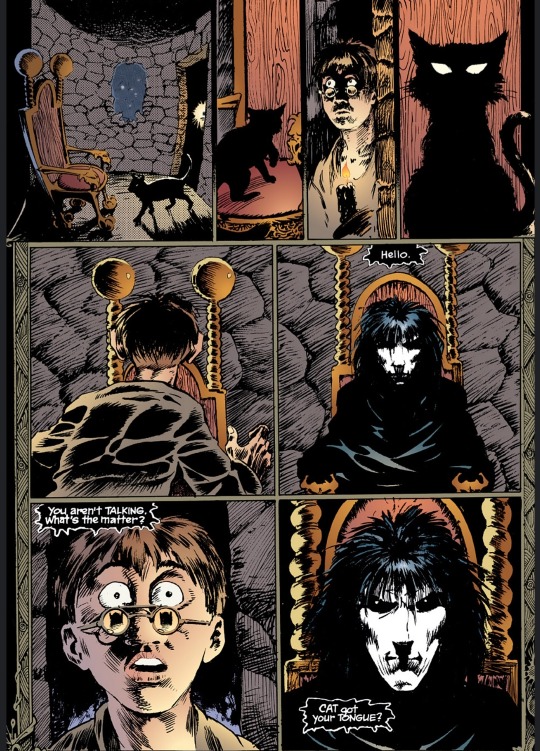
5. Catastrophe: Morpheus latches onto a dream of one of his guardians, and manages to neutralize them. From here, it's all an hectic climax towards Alex's disaster: once he finds some food and clothes, the first thing Dream wants to do is get his vengeance. Alex finds himself confronting him in a dream, and all he can do is babble excuses and hear the sentence: Eternal Waking. You know when you have those dreams within a dream? That. Only, Alex's gets just nightmares, and he can't ever wake up for real. His story for the moment is concluded, his future is an horrifying damnation. Now, we'll follow Dream as he returns to his former power.
NARRATIVE DEVICES
This first chapter exposes the Inciting Incident that will drive the rest of the volume: the ritual that imprisons Dream. The chapter tells his wait for the right occasion to escape and eventual success; the next chapters of Preludes and Nocturnes will show his work to reinstate himself to his former position.
From there, we are exposed to a slow-building climax, a feeling of expectation marked by Morpheus' monosyllabic thoughts, which reaches its peak in the last pages of the chapter, when Morpheus actually frees himself and proceeds to enact a nightmarish punishment on Alex Burgess.
Speaking of Morpheus, there is an interesting subversion of the trope of 'Time moving faster for immortals'. Seventy years should be nothing in comparison to how much this guy has lived, should feel like nothing, and instead it's revealed that the Endless' perception of time is no different than a human. He felt all of seventy years spent doing nothing under that glass prison. Ouch.
Lastly, this chapter is a little gem of 'Show, don't tell'. The characters don't stand around stating their emotions, rather they may even try to dissimulate them (the two Burgesses as they grow old and frustrated, threatening Morpheus to hide how powerless they feel), but they always emerge clearly from their words and actions. The narration itself helps: it acts more as a factual report of the events without dwelling on the causes, leaving the reader to figure them out for themselves. See how this panels shows Alex's emotions regarding his father:
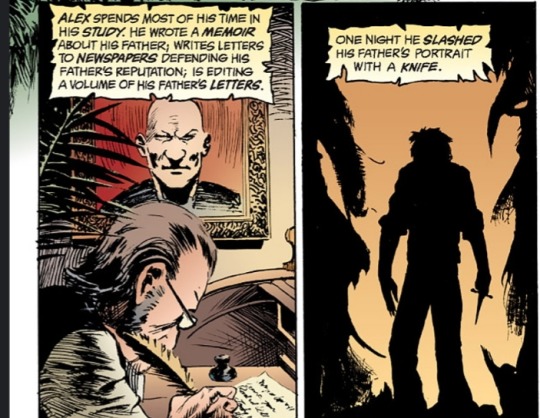
In the previous vignettes, we have seen Roderick going from approving to verbally abusive towards his son, we have seen him swinging from the powerful leader of an occult society, master of lethal dark magic, to some old guy bitching about how it wasn't fair that he had to grow old and die like everybody else. In any case, Alex has always been shown as a submissive figure, assisting his father while having little word in edgewise. So here: a loyal son dutifully writes a memorarum on what a great man his father was, and then his frustrations boil over and he destroys his image with a knife.
Which, considering how he's starting to conclude his life just like he did, might be a reference to the Picture of Dorian Gray?
Lastly, I've noticed something brilliant in the use of Morpheus' perspective. In this analysis, I repeatedly call both Burgesses 'pathetic'. But here's the thing: for the most of their scenes, they look like powerful masters of the occult, rich and with successful lives, with sway over people - especially Roderick. When is that they look at their weakest? When they're seen through the eyes of Morpheus. He is Dream of the Endless, the very concept of dreams, stories, and fantasies, and these are two randos who come bitching at him that they wanted to be immortal and all-powerfuls. When the Burgesses come to complain and make empty threats, their most pitiful behaviour, their features appear tearful, a bit exaggerated exaggerated, in contrast with their normally elegant and well-kept selves. That glass dome represents Morpheus' prisony, but also his privileged eye on Roderick and Alex's weaknesses.
CHARACTERS
The most relevant characters in this episode are the two Burgesses and Morpheus. The first two play in the archetype of the Magician, especially its more corrupt version, with Roderick Burgess being the more straightforward example. He dwells into arcane magic, is at the center of scandals in which the police can't exactly pin the blame on him, disposes of people like they're nothing but tools, imprisons entities from beyond this world. But he deconstructs that archetype in that he's ultimately just an human being, and a fairly pathetic one at that: he's afraid of growing old and die, and that was all the core of his actions. Alex is even more of a deconstruction: he is almost always seen as his father's lackey, never surrounded by followers like he was; all he gets are some New Age enthusiast whom he mostly exploits, and eventually dump him. He grows old, never escaping the shadow of his father, and eventually turns into a copy of him at his most pathetic, with the constant presence of Paul as the only source of solace that we can see.
And then there's Morpheus. He has relatively little 'screentime' in his own debut, but what we see is sufficient to give a quite strong idea of him. He is immensly powerful, prideful - he never concedes or even acknowledges Burgess' demands - and vengeful: Roderick is out of his reach, having been long dead, but Alex, who had made himself responsible by not freeing him when he had the chance, is condemned to an eternity of nightmares.
Morpheus is also shown to be incredibly patient and good with long term planning: see when he faked collapsing to get the guards to open his dome? They mention he had never even shifted position before. He spent all of seventy years sitting like that only to be able to pull that particular trick. We'll see how all of these characteristics will play out in the story to follow.
The other characters are all quite minor: Paul is noticeable only for his skepticism and devotion to Alex, an hint of better sides to that man than those we have seen; other figures only appear with short interludes to show the effects of the sleep sickness, with Unity Kincaid as the only one to have some relevance in the future story.
THEMES
Dream, Death, and by contrast wake and life are center stage in this volume. In this chapter, the theme of life and death is explored by the Burgesses: they believe themselves above other humans and thus above the 'duty of dying', attempt to imprison Death to get immortality, and miserably fail. In doing so, they also fail to live: they both waste their lives in empty exercises of power and influence, and as they grow old, they don't accept that their life is at the end, they have nothing to look back at with fondness, they can only complain uselessly. The epitaph of Roderick's grave is basically an ode to denial.
But even if it wasn't the one they meant, their action still had an impact on another realm: that of dreams and waking. And it's entirely disruptive: as a consequence of Morpheus' disappearence, people are either unable to wake up, and spend whole lifetimes as comatose bodies disposed of by others, or unable to sleep - and the stress of constant wake drives them to an early grave - or spend their life in a limbo that is neither, avoided by 'normal' people and unable to interact with them. The moral here is a nice old 'try fucking with the laws of nature, and you will only be screwed worse, with added collateral damage'.
There is also the thematic of 'personal responsibility' in Alex's arc: while he was a mere witness to the ritual that imprisoned Morpheus, and moreover just a child at the time, he actively decided to do nothing when he got the power of freeing him. He didn't trust that the prisoner wouldn't have taken vengeance, and tried to let him there for as long as he could, forsaking doing the right, compassionate thing over an hope to live out his life untroubled. As a result, when his plans went awry and Morpheus freed himself anyway, he was recognized as just as guilty as his father and punished accordingly. Per quanto voi vi crediate assolti siete lo stesso coinvolti.
SYMBOLISM
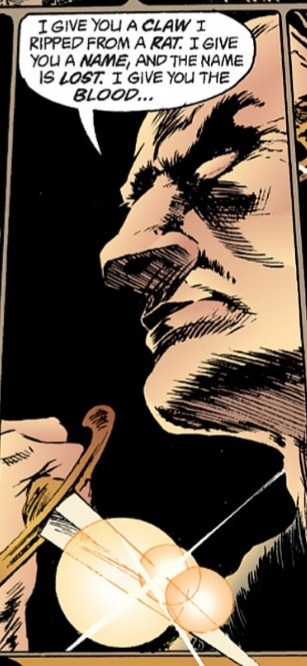
• The Name: in the incantation that binds Morpheus, the phrase 'I give you a name, and the name is Lost' is said. While there is a lot of folklore and mythology regarding the fact that knowing something/one's 'true name' gives you some kind of power above the thing/person ( Isis creating an elaborate trap to force Ra to reveal his, Lilith turning into a demon after pronouncing God's name, the advice of not revealing your name when dealing with the fair folk) but here they use a variant: they don't care about the True Name of the entity, who is the wrong one by the way, but they're the ones who give it a new way to be called. This concept also recalls one in the Bible, the way God creates the world by calling things into existence and later gives Adam the power over all other lifeforms by allowing him to name them. In the case we have seen in this chapter, it looks like a more malignant way of exerting power: instead of showing it by knowledge of the entity's True Name, or true essence and identity, they overimpose it with something of their choice; namely 'Lost', a word that defines the victim as someone separated from familiar places and people, and thus in the power of their captors.
• The Helmet, the Ruby and the Sand: they show up briefly in this chapter, as the tools of Morpheus' powers. By taking them away, the cultists further exert their power over the prisoner, even if they don't know how to use them; they are reduced to random 'powerful objects' that magicians quarrel over and steal from each other, and are ultimately scattered and lost.
• The Black Cat: right before his confrontation with Alex in the latter's dream, Morpheus takes the shape of a black cat. These animals (besides being nocturnal, so a nice imagery for Dream) have a long story of being associated to the supernatural, either as good or bad omens; particularly, a black cat walking away from you, like the one Alex sees and tries to follow, was considered a sign of bad luck in early times, particularly fitting with what's about to happen to Alex.
REFERENCES
• The mansion where the chapter takes place is located in Wych Cross, a place that on early documents is spelled also as 'Wytch Cross' or 'Witch Cross'. Even if the etymology probably doesn't come from there, it's a nice nod to the supernatural activities that take place there.
• Near the start of the chapter, Roderick mentions an 'Aleister' that keeps making fun of him. This is a reference to Aleister Crowley, who at the time of the story was living in the New Hampshire.
• During the ritual that binds Morpheus, Roderick Burgess invokes several 'old gods':
1. Namtar comes from Mesopotamian religion, and depending on the context he was regarded as either a minor deity, the attendant of the Goddess of the Underworld Ereshkigal, or a demon of disease.
2. Allatu is another Mesopotamian deity, one associated with the underworld; in a later time she was identified with the aforementioned Ereshkigal.
3. Morax is a Great Earl and President of Hell mentioned in the Pseudomonarchia Daemonum and the Goetia; he teaches Astronomy and liberal arts.
4. Naberius is a Marquis of Hell, and he can make men proficient at all arts, especially rethoric.
5. Klesh might be referring to the Kleshas, which according to Buddhism are mental states that cloud the mind and result in unwholesome actions.
6. Vepar is a Grand Duke of Hell mentioned in Ars Goetia, who helds domain over the sea.
7. Maymon is a prince of Hell mentioned in the Goetia. He requires that his summoner stands upright with cap or headdress removed as a sign of respect, and in fact, Burgess is the only one of the circle to have the hood down.
8. Ashema-Deva ('wrath demon') is believed to be where the name Asmodeus comes from, but the thing is heavily discussed. Asmodeus, besides still figuring in the Ars Goetia, is the main antagonist in the Book of Tobit, where he persecutes a young woman by killing everyone who marries her during the first night.
9. Maborym is possibly derived from Haborym, Great Duke of Hell that causes fires in forests and castles; because I doubt Gaiman is referring to the first search result I got, about the demon Aborym in an Italian movie where a werewolf goes against the camorra. Se qualcuno è interessato, si chiama 'La Croce delle Sette Pietre', è stato proiettato in due soli cinema in Sicilia, e le recensioni dicono che fa cagare.
10. Horvendile is the odd one out, likely named after a character in the book 'The Cream of the Jest' by James Branch Cabell, who is aware that he lives in a work of fiction. Might be fitting with Sandman being 'a story about stories'. Especially since this scene is set in 1916, and Cabell's book came out in 1917.
Burgess' second in command in named Ruthven Sykes: the first name is probably a reference to Lord Ruthven, the titular character of Polidori's 'The Vampyre'. His secret name, Ararita, is the acronym of the Hebrew phrase 'Achad Rosh Achdotho Rosh Ichudo Temu rahzo Achad', which should mean 'One is His Beginning, One is His individuality, His Permutation is One'.

Honor mention to Wesley Dodds: he was the first of the DCU characters to bear the name of Sandman, the one this series should have been a reboot of. His story, larged abandoned after the Silver Age, had a revival due to the fame of Gaiman's Sandman.
So! This was all for my first Tentative Analysis.
Thanks to anyone who read until the end. If you liked my analysis, could you please consider sending me a ko-fi?

#the sandman#sandman#sandman meta#sandman analysis#sandman morpheus#sandman roderick burgess#sandman alex burgess#neil gaiman#vertigo comics#tentative analyses#tentative analyses: the sandman
53 notes
·
View notes
Text
(comic spoilers ahead) actually crazy to think that morpheus must have been worn out for so long (since orpheus & then the overture situation) and that burgess capturing him had only catalysed that fatigue like it definitely changed him but that change was also accelerating his meticulously cultivated suicide (that he himself may not have been entirely aware of) because we all know the lord of dreams hates change it throws him off balance and balance is something he holds so dear to himself that's his entire principle — which is why it's so tragic to see from that angle because you end up thinking. well that's just inevitable isn't it. that just seems bound to happen. he was bound to die. he was already exhausted from what happened during overture despite not even remembering the events that occurred. he was exhausted after being trapped in that cage. he was exhausted when he had to do that to orpheus. he was exhausted with how much he was changing. and the Lord of dreams cannot change. that exchange between matthew & lucien explained more than anything ever could; "lucien? why did he let it happen?" "let it, matthew? i think he did more than let it happen. charitably, i think, sometimes, perhaps, one must change or die. and in the end, there were, perhaps, limits to how much he could let himself change." orpheus' death changed him. overture changed him. the imprisonment changed him. befriending hob changed him. watching lucifer leave their post changed him. alot more changed him. until. he simply couldn't. and because he cannot abandon his responsibilities due to that change he just. submits to death instead. he succumbs. he was given a way out. and he willingly fell through it. and it's that lack of fight on his end is what breaks me the most. how he was so tired he didn't have any strength to fight back. even death said he'd been through worse & managed to get up but not this time. and i think that's the most tragic part of it.
#sorry this is a very diluted analysis but it's only because delving deeper would only hurt me#im STILL hung up on this#i STILL think of the dialogues:#'dream of the endless cannot die'#'what are we mourning then'#'the death of a perspective'#as if that was all he was. a perspective#even though afterwards it was so obvious he was More than that#mad hettie knew that#hob knew that#his entire Endless family knew that#all his otherworldly acquaintances knew him#and so to see that dialogue reducing him to just being a Perspective of an anthropomorphic personification of dreams. yea that hurt#sandman spoilers#sandman comic spoilers#the sandman#the sandman comic spoilers#dream of the endless#the kindly ones
15 notes
·
View notes